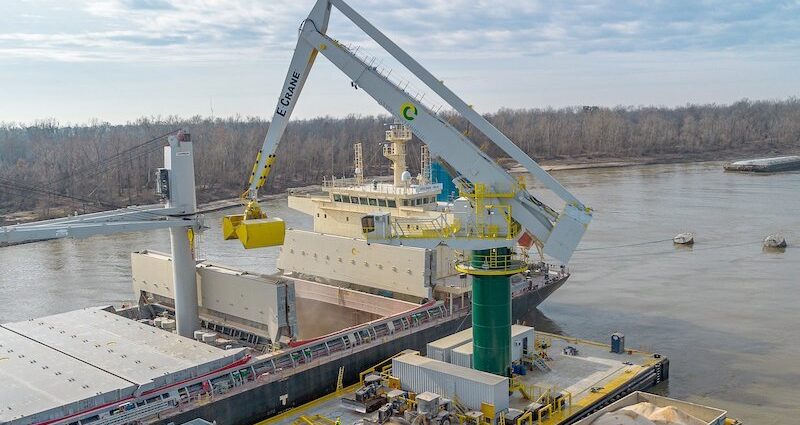Cooper Consolidated, LLC has announced the expansion of its bulk stevedoring fleet with the addition of two 4000C Series Equilibrium Cranes, the largest cranes ever built by E-Crane. These cranes, named “Pelican” and “Creole King,” reinforce the company’s position as the leading bulk stevedoring service provider on the Mississippi River. This development highlights key innovations in bulk cargo handling that could benefit African port operators seeking to enhance efficiency and capacity.
“Cooper Consolidated is constantly aiming to provide our customers with the highest quality of service and the most efficient cargo handling,” said Chris Blanchard, Executive Director of Cooper Consolidated, LLC. “The addition of North America’s largest E-Cranes to our fleet helps us continue to meet our high standards and exceed our customers’ expectations.”
The deployment of high-capacity equilibrium cranes is a significant technological advancement for bulk and breakbulk handling. These cranes offer reduced maintenance, extended component life, and improved energy efficiency—critical factors for ports in Africa aiming to modernize their infrastructure while minimizing operational costs.
Each crane is mounted on newly built barges measuring 200’ x 72’ x 12’, constructed in 2024 at Corn Island Shipyard in Grandview, Indiana. The floating crane solution allows for greater flexibility in cargo handling, which is particularly relevant for African ports with evolving infrastructure and increasing cargo demands.
“The decision to bring the largest E-Cranes to the Mississippi River was a collaborative effort between the E-Crane and Cooper Consolidated teams and continues our tradition of adding unique assets to our operations that offer value for our customers,” said Billy Fitzpatrick, Managing Director of Sales and Stevedoring at Cooper Consolidated, LLC.
The “Pelican” crane was commissioned in December 2024, and the “Creole King” is set to begin operations in May 2025. These cranes will facilitate efficient handling of various bulk commodities, including grain, minerals, and other critical cargoes—key sectors for Africa’s growing trade in bulk materials.
Cooper Consolidated’s operations span the Lower Mississippi River, covering New Orleans, Baton Rouge, South Louisiana, and Plaquemines. Its asset-backed stevedoring, barge, marine, and logistics services ensure reliability and flexibility, a model that could inspire similar developments in Africa’s rapidly expanding maritime trade sector.
With increasing investments in African ports, the implementation of advanced equilibrium cranes like those deployed by Cooper Consolidated presents an opportunity for African port operators to enhance operational efficiency, improve cargo throughput, and reduce environmental impact. As Africa continues to develop its maritime logistics network, lessons from North America’s bulk handling advancements can offer valuable insights into building a more resilient and modern port infrastructure.




